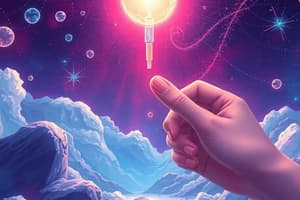Podcast
Questions and Answers
Which hormone is responsible for decreasing blood glucose levels?
Which hormone is responsible for decreasing blood glucose levels?
- Cortisol
- Glucagon
- Growth hormone
- Insulin (correct)
What is the primary source of energy for the body's cells?
What is the primary source of energy for the body's cells?
- Lipids
- Insulin
- Fats and oils
- Glucose (correct)
What is the normal range for blood glucose levels?
What is the normal range for blood glucose levels?
- 40 mmol/l - 2.2 mg/dL
- 2.2 mmol/l - 400 mg/dL
- 400 mmol/l - 2.2 mg/dL
- 2.2 mmol/l - 40 mg/dL (correct)
Which type of hormone increases blood glucose levels?
Which type of hormone increases blood glucose levels?
What can cause hypoglycemia?
What can cause hypoglycemia?
Flashcards
What is Insulin?
What is Insulin?
A hormone that lowers blood glucose levels by promoting glucose uptake by cells.
What is Glucose?
What is Glucose?
The body's main energy source, derived from carbohydrates in food.
What is Glucagon?
What is Glucagon?
A hormone that elevates blood glucose levels by stimulating the liver to release stored glucose.
What is Hypoglycemia?
What is Hypoglycemia?
Signup and view all the flashcards
What causes Hypoglycemia?
What causes Hypoglycemia?
Signup and view all the flashcards
Study Notes
Hormonal Regulation of Blood Glucose
- Insulin decreases blood glucose levels by facilitating the uptake of glucose into cells and promoting its conversion into glycogen in the liver and muscles.
- Glucagon, produced by the pancreas, increases blood glucose levels by stimulating glycogenolysis and gluconeogenesis, releasing glucose into the bloodstream.
Energy Source for Cells
- Glucose is the primary source of energy for the body's cells, utilized to generate ATP (adenosine triphosphate) through cellular respiration.
Normal Blood Glucose Levels
- The normal range for blood glucose levels is approximately 70-100 mg/dL when fasting and up to 140 mg/dL two hours after eating.
Causes of Hypoglycemia
- Hypoglycemia can be caused by various factors including excessive insulin administration, prolonged fasting, rigorous exercise, alcohol consumption, and certain medications.
Studying That Suits You
Use AI to generate personalized quizzes and flashcards to suit your learning preferences.




